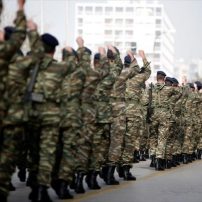
The alternative military service for conscientious objectors must have purely political character and not military nature.
JUDGMENT
Adyan and others v. Armenia 12/10/2017 (no. 75604/11)
SUMMARY
Jehovah’s Witnesses and Military Service. Refusal to perform a military service or an alternative civil service. The right to conscientious objection is enshrined in Article 9 of the ECHR. The alternative military service should be purely political in nature and completely separated from the military. The alternative civil service in Armenia was not purely political in character, since military officers took part in its oversight, gave orders for transfers and set missions, and was 1,5 times longer than the military and thus have punitive character. Violation of freedom of religious conscience.
PROVISION
Article 9
PRINCIPAL FACTS
The applicants, Artur Adyan, Garegin Avetisyan, Harutyun Khachatryan and Vahagn Margaryan, are Armenian nationals. Mr Adyan was born in 1991; the other three applicants were all born in 1993.
They live in Yerevan, Tsaghkavan and Kapan (all in Armenia).
In May and June 2011 the applicants were called up for military service. Addressing letters to the local authorities, they refused to appear either for military or alternative service. They stated that their opposition was based on their religious beliefs. Furthermore, even though domestic law did provide for alternative service, they claimed that it was not of a genuinely civilian nature, as it was supervised by the military authorities. They submitted the same arguments in the ensuing criminal proceedings brought against them for draft evasion. They were however all convicted in July/November 2011 and sentenced to two years and six months in prison.
They appealed, further arguing that the alternative labour service programme was essentially under military control and supervision in as far as it concerned transfers, sanctions and orders. They also pointed out that they were required to wear a uniform which resembled that of the military and to be at their place of assignment 24 hours a day. Moreover, alternative service was punitive in nature as it lasted 42 months (rather than the 24 months for military service). The Court of Appeal subsequently upheld the applicants’ convictions: it found that, although the labour service available contained a few formal elements of military supervision – such as provision of clothing, food and financial means as well as other organisational work – it was still civilian in nature. The applicants’ further appeals on points of law were ultimately – between February and May 2012 – declared inadmissible for lack of merit.
The applicants were released from prison in October 2013 following a general amnesty, after having served between 26 and 27 months of their sentences. Three out of the four applicants spent periods in pre-trial detention which formed part of their convictions.
THE DECISION OF THE COURT
The Court pointed out that it was not sufficient for a State to have introduced an alternative to military service – as was the case in Armenia since 2004 – to comply with the right to conscientious objection guaranteed by Article 9 of the Convention. A State was also required to organise and implement such a system – whether in law or in practice – in a way which was genuinely civilian and not deterrent or punitive in character.
However, although alternative labour servicemen were assigned to such civilian institutions as orphanages, retirement homes and hospitals, the Court considered that the system available to the applicants at the time had not been of a genuinely civilian nature. In particular the alternative service was not sufficiently separated from the military system. The military were involved in the supervision of the civilian institutions, carrying out regular spot checks, taking measures in the event of unauthorised absence, ordering transfers and determining assignments. Furthermore, the Internal Rules of Service in the Armed Forces were used for certain organisational aspects of the alternative service. As regards appearances, civilian servicemen were required to wear a uniform and to stay at their place of service; they also had “the Armed Forces of Armenia” written on the cover of their record booklets.
Furthermore, in the Court’s opinion, the fact that alternative service was significantly – more than one and half times – longer than military service had to have had a deterrent effect, containing a punitive element.
Indeed, in 2011 the Armenian parliament was explicit in its criticism of the alternative to military service, and pointed out two main shortcomings: the military supervision and its duration. As a result, legislative amendments were introduced in 2013. Even though those amendments had allowed the applicants to apply for the replacement of the remainder of their sentences with alternative service and to have their convictions quashed, it would not appear from the Armenian Court of Cassation’s case-law that a violation of their rights under Article 9 would have been acknowledged or, moreover, that any compensation would have been awarded. In any case, by the time the legislative amendments had been introduced, the applicants had already served almost two years of their sentences.
In conclusion, the Court found that the Armenian authorities had failed at the relevant time to make appropriate allowances for the applicants’ conscience and beliefs and to guarantee a system of alternative service that had struck a fair balance between the interests of society as a whole and those of the applicants. Therefore, the applicants’ convictions had not been necessary in a democratic society, in violation of Article 9.
Given its findings under Article 9, the Court considered that the main legal question in the case had already been examined, and therefore held that there was no need to rule separately on the complaints brought by three of four the applicants under Article 5.
Just satisfaction (Article 41)
The Court held that Armenia was to pay the applicants 12,000 euros (EUR) each for non-pecuniary damage(echrcaselaw.com editing).


